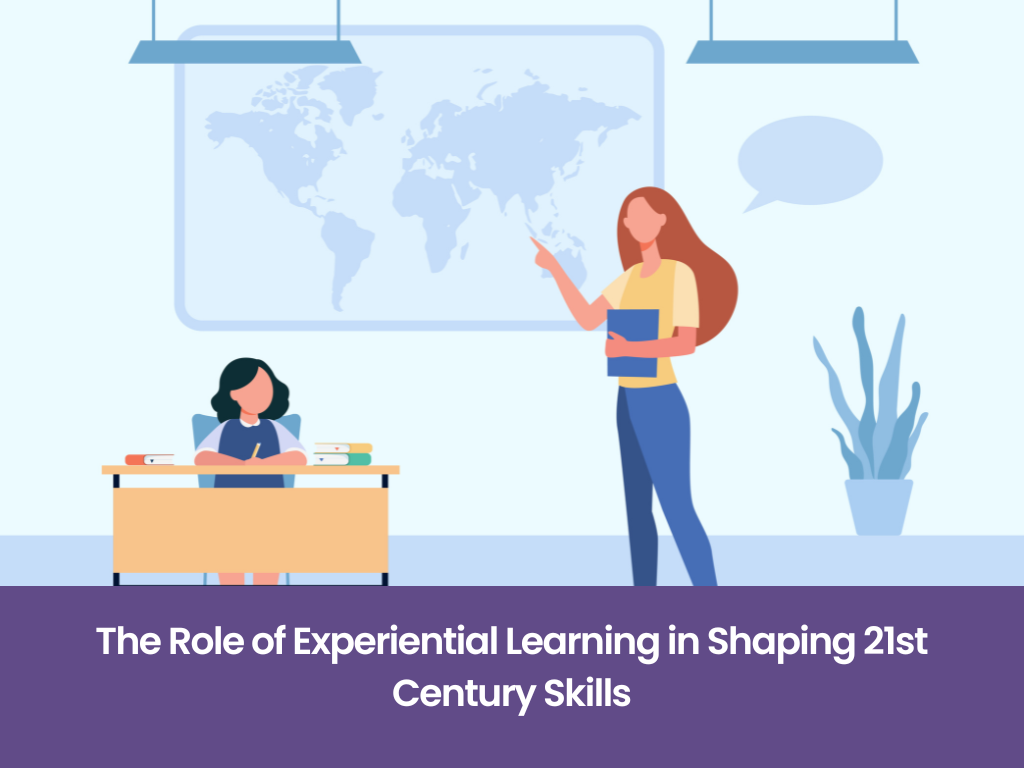The Role of Experiential Learning in Shaping 21st Century Skills
posted on Mar 13, 2024
In today's rapidly changing world, traditional classroom instruction alone may not be sufficient to prepare students for the challenges and opportunities of the 21st century. Experiential learning, which emphasizes hands-on experiences, real-world applications, and active engagement, has emerged as a powerful educational approach.

Introduction
In today's rapidly changing world, traditional classroom instruction alone may not be sufficient to prepare students for the challenges and opportunities of the 21st century. Experiential learning, which emphasizes hands-on experiences, real-world applications, and active engagement, has emerged as a powerful educational approach to develop critical thinking, problem-solving, creativity, collaboration, and other essential skills needed for success in the modern era. BGS Vijnatham, Top Schools in Greater Noida, recognizes the importance of experiential learning in shaping 21st-century skills and provides insights into its implementation and impact.
Understanding Experiential Learning
Experiential learning is a pedagogical approach that emphasizes learning through direct experience, reflection, and application. It involves engaging students in authentic, real-world activities that allow them to explore, experiment, and discover knowledge and skills in context. Experiential learning encompasses a variety of activities, including project-based learning, inquiry-based learning, simulations, field trips, internships, service-learning, and outdoor education, among others. Key principles of experiential learning include:
- Active Engagement: Students actively participate in hands-on activities and experiences that require them to apply knowledge, skills, and concepts in real-life situations.
- Reflection: Students engage in reflective practices to process and make meaning of their experiences, identifying insights, challenges, and areas for growth.
- Authenticity: Experiences are authentic and meaningful, aligning with students' interests, goals, and aspirations, and connecting to real-world contexts and challenges.
- Collaboration: Experiential learning often involves collaborative and cooperative learning experiences where students work together in teams, sharing ideas, perspectives, and resources to achieve common goals.
- Application: Experiences provide opportunities for students to apply what they have learned to solve problems, make decisions, and create tangible outcomes with real-world relevance.
Role of Experiential Learning
Top schools in Greater Noida recognize the transformative potential of experiential learning in shaping 21st-century skills and preparing students for success in a dynamic and interconnected world. Here are some insights into the role of experiential learning in these institutions:
- Project-Based Learning (PBL): Schools implement project-based learning approaches that allow students to explore complex, real-world problems and challenges, conduct research, analyze data, and develop solutions collaboratively. Projects are often interdisciplinary and inquiry-driven, enabling students to apply knowledge and skills from multiple subject areas in authentic contexts.
- Hands-On Science and STEM Education: Schools prioritize hands-on, inquiry-based approaches to science and STEM (Science, Technology, Engineering, and Mathematics) education, providing students with opportunities to engage in experiments, design challenges, and engineering projects that promote critical thinking, problem-solving, and innovation.
- Field Trips and Outdoor Education: Schools organize field trips, outdoor education programs, and nature-based experiences that connect students with the natural world and foster environmental stewardship, curiosity, and appreciation for the outdoors. These experiences provide opportunities for experiential learning, sensory exploration, and place-based education.
- Internships and Career Exploration: Schools facilitate internships, job shadowing, and career exploration opportunities that expose students to diverse professions, industries, and workplace environments. Through hands-on experiences in real-world settings, students gain practical skills, industry insights, and career readiness competencies.
- Service-Learning and Community Engagement: Schools integrate service-learning projects and community service initiatives into the curriculum, allowing students to apply their knowledge and skills to address community needs and make a positive impact. Service-learning experiences promote civic engagement, empathy, and social responsibility while reinforcing academic learning objectives.
- Simulations and Role-Playing: Schools use simulations, role-playing activities, and immersive experiences to recreate real-life scenarios and situations, allowing students to step into different roles, perspectives, and contexts. Simulations foster empathy, critical thinking, decision-making, and communication skills while providing a safe and controlled environment for experimentation and learning.
- Creative Arts and Performing Arts: Schools incorporate creative arts and performing arts activities, such as visual arts, music, drama, and dance, into the curriculum to provide students with opportunities for self-expression, creativity, and aesthetic appreciation. Through experiential arts experiences, students develop confidence, imagination, and emotional intelligence.
Impact and Future Directions
The integration of experiential learning at BGSVS has had a profound impact on students' academic achievement, personal development, and future success. Students demonstrate enhanced critical thinking, problem-solving, collaboration, communication, and leadership skills, along with a greater sense of agency, resilience, and self-efficacy. Looking ahead, schools aim to further innovate and expand their experiential learning initiatives by leveraging emerging technologies, fostering interdisciplinary connections, and promoting global collaboration and social entrepreneurship in an increasingly interconnected and complex world.
Conclusion
BGS Vijnatham, Top Schools in Greater Noida are committed to leveraging the power of experiential learning to nurture 21st-century skills and empower students to thrive in a rapidly changing world. Through project-based learning, hands-on science and STEM education, field trips and outdoor education, internships and career exploration, service-learning and community engagement, simulations and role-playing, and creative arts and performing arts, these institutions provide students with authentic, meaningful, and transformative learning experiences. By embracing experiential learning as a core pedagogical approach, its counterparts are shaping future-ready learners who are equipped with the knowledge, skills, and values to succeed and lead with purpose and passion.